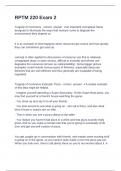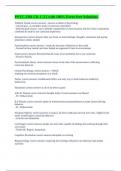RPTM 220 Exam 2
Tragedy of Commons - correct answer ✔an important conceptual frame
designed to illuminate the ways that humans come to degrade the
environments they depend on
It is an example of what happens when resources get scarce and how quickly
they can sometimes get used up
concept is often applied to discussions of resource use that is relatively
unregulated (easy or open access, difficult to exclude) and whose use
degrades the resources (known as subtractability). Some bigger picture
examples could include various types of fisheries, especially deep-sea
fisheries that are well offshore and thus generally are incapable of being
regulated.
Tragedy of Commons Example: Pizza - correct answer ✔A simple example
of this idea might be helpful.
· Imagine yourself attending a Super Bowl party. At this Super Bowl party, you
may find yourself at a friend's house watching the game.
· You show up and say hi to all your friends.
· You look around to see what is going on - who all is there, and also what
kind of food or snacks are on offer.
· That is when you see a pizza sitting on the table.
· You realize you haven't had pizza in a while and that pizza sounds really
good. And so you make a mental note that you're going to eventually circle
over and get yourself a piece of pizza.
You get caught up in conversation with friends, and maybe some exciting stuff
is going on in the game, so you haven't quite made it over the pizza just yet.
When you look over, there's still plenty there so you're not worried about it. A
,little later when you look over at pizza, it has started to dwindle and now you
feel yourself getting a little anxious to get over there while there is still enough
left to satisfy your craving. But it's okay because there is still half a pizza, so
you're not rushing, you're not getting too uncomfortably anxious about it, but
you are aware that the pizza is dwindling over there and maybe you starting to
keep watch on it out of the corner of your eye.
You are caught up in the game or a conversation and by the time you circle
back around to the pizza, it's on the very last piece. Now the anxiety sets in-
you're practically pushing people out of the way to get over to that table and
get that last piece because if you don't get it before it's gone, somebody else
is going to.
That is what happens as environmental resources get scarce!
Commonly Shared / Common Pool Resource - correct answer ✔In situations
like this where there's not really specific ownership regimes over each slice of
pizza (where it's considered as fair game for everybody).
- The Atmosphere
Certainly, the atmosphere has been treated as a common pool resource that
we've mistreated and abused. Historically, nobody has been held accountable
for degrading the atmosphere. It is only recently that we're starting to draw
attention to how much degradation to the atmosphere we've been doing and
to the impacts this has on humans (e.g., climate change, impacts on food
production, sea-level rise, storm intensification, etc.). We are now making our
first efforts to try to account for that degradation.
Collective Interest - correct answer ✔where there's a lot of trust, reciprocity,
and strong relationships between people, they are more likely to act in
collective interest rather than just their own individual interests
,Urgency - correct answer ✔There are also very familiar, non-resource
examples that play on this psychological feeling or sensation of the need to
act as resources get scarce. People want to get stuff before it's gone.
Nowadays you're likely to see products on Amazon, or tee times, or campsite
requests, or airfare and hotel rooms, or even seats in a class when you're
booking your classes, accompanied by some text along the lines of, "only 2
left!" It's not uncommon to get these little notices that say this is the last
product or booking left, or that this tee time or campsite or airfare is about to
be gone, or that there are only two or three seats left in a class. You can "feel"
your psychology enacting and urging you into action when you know that
things will get scarce. These companies know that too, and they capitalize on
that psychology to use those messages to get you to pull the trigger on their
airfares, their hotel rooms, their products on Amazon, and so forth.
How do we resist the urge to overuse resources?
How do we avoid tragedies of the commons when we know they lead to
overuse and degradation of the resources on which we depend? - correct
answer ✔The answer involves transitioning the focus from individual interest
to collective wellbeing.
Planetary Boundaries - correct answer ✔These are the operating limits of the
planet that support human wellbeing. If these critical boundaries are crossed,
there will be dramatic implications for our ability to continue meeting our own
needs as a species.
In the pre-industrial time, we were nowhere near the thresholds of any of the
Planetary Boundaries. Human activity occurred well within the safe operating
zone of these boundaries. By the 1950s, we had begun to impact the integrity
of the biosphere. By the 1990s, stratospheric ozone depletion had also
became a major concern. Yet, as of recently, we have been able to move
away from that particular boundary while we've begun to approach several
others (e.g., biogeochemical flows, land-use change, and climate change). It
is clear, as we'll continue to see, that human action -- and inaction -- is linked
to how close we get to these Planetary Boundaries. Looking at the case of
ozone depletion as a prime example, the concerted action in the collective
, interest has proven successful at moving ourselves away from critical tipping
points associated with these Planetary Boundaries.
Planetary Boundaries Factors - correct answer ✔climate change, novel
entities (not yet qualified), stratospheric ozone depletion, atmospheric aerosol
loading (not yet qualified), ocean acidification, biogeochemical flows, fresh
water use, land-system change, bill (not yet quantified), and biosphere
integrity
Climate Change - correct answer ✔Climate change is identified by Sachs as
the first and most important of the Planetary Boundaries. The most important
thing to remember in this lesson is that climate change is occurring because
of the greenhouse gases that human activity puts into the Earth's atmosphere.
Climate change is not global warming, but rather it is more appropriately
conceived of as climate disruption. The climate and associated weather
systems are becoming more unpredictable and more intense. Storms have
started becoming more severe, rainfall patterns now have less pattern and
thus disrupt agricultural efforts. The climate has the potential to disrupt food
production and thus food security -- something that has the potential to create
much in the way of human conflict in the future.
We must work to act in collective, global ways to move away from critical
climate thresholds and keep human activity within a safe operating space for
our species. Until we do so and until the impacts on the atmosphere become
more regulated, our impact on the atmosphere may be a tragedy of the
commons where people just continue to degrade the atmosphere with
greenhouse gases at faster and faster rates!
Biosphere Integrity - correct answer ✔Biosphere integrity most often refers to
biodiversity and endangered species.






